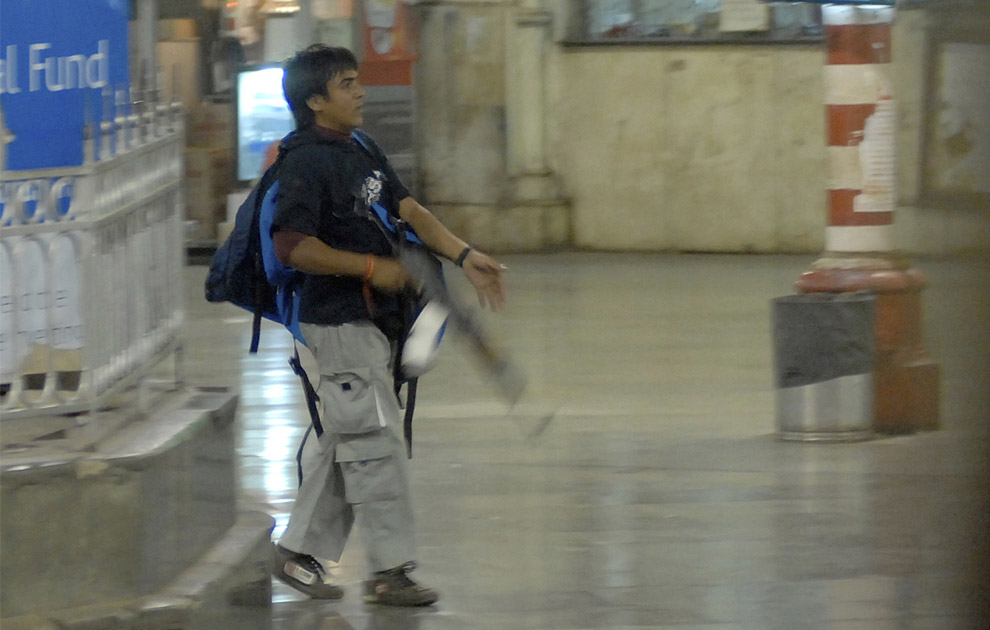 (A gunman walks through the Chatrapathi Sivaji Terminal railway station in Mumbai, India, Wednesday, Nov. 26, 2008. (AP Photo/Mumbai Mirror, Sebastian D'souza. Click here for a collection of photographs, including this one)
(A gunman walks through the Chatrapathi Sivaji Terminal railway station in Mumbai, India, Wednesday, Nov. 26, 2008. (AP Photo/Mumbai Mirror, Sebastian D'souza. Click here for a collection of photographs, including this one)A colleague asked me whether my friends and family were okay, in the context of the recent terrorism nightmare in India. I told her that everybody was fine, and then added that it does not make the incident any less of a human tragedy with immense geopolitical implications.I have been to Bombay only once. Yes, I continue to refer to the city as Bombay—as my own protest against the explicitly communal and political calculations that went into the renaming that was led by the right-wing Hindu nationalist party, Shiv Sena. In 1995, Shiv Sena won the elections in the state of Maharashtra, where Bombay is located, and forced the name change to Mumbai, much to the displeasure of many in the city and the rest of the country too.
During that visit, when the city was officially only Bombay, I was completely overwhelmed by the crowds at Victoria Terminus, which also has undergone a name change to Chatrapati Shivaji Terminus. At this railway station, terrorists killed 56 and injured 98 others.
In fact, if there is one thing I remember about Bombay after all these years, it is how crowded it was. Interestingly enough, despite all that crowd and my phobia for getting trapped in one, I don’t think I ever felt unsafe. In contrast, I was a lot more worried about my safety when I was a graduate student in Los Angeles where, to my horror, a student was mugged and shot just a few steps away from the university-owned apartment complex.
Over the recent years, many Indian cities, including Bombay, have been easy targets for militants. The first major organized attack occurred on December 13, 2001—a short three months after our own 9/11—when five terrorists, who were later identified as Pakistani nationals, blazed their way through India’s parliament building.
There is a Pakistani dimension in the latest terrorist attack too. Emerging details indicate that the terrorists were not “home grown” but might have been affiliated with, or trained by, a militant group called Lashkar-e-Taiba, often abbreviated as LeT, which was allegedly involved with the attack on the parliament building. Driving India’s security forces out of the much contested Kashmir is LeT’s primary goal, but apparently it operates far away from Kashmir also.
LeT was overtly founded by Pakistan’s intelligence agency, but in a short period of time the Pakistani government lost control of its own creation. Soon after 9/11, the US government added LeT to its list of terrorist organizations, and later the group was banned in Pakistan as well.
In these pages, I have expressed my concerns over Pakistan. Its wild west is pretty much a country all to itself, over which the federal government rarely has any control. This western province provides a safe haven to the Afghan Taliban and to al-Qaeda. At the other end, Pakistan has been involved in a long struggle with India over Kashmir. In the southern part lies Karachi, which is Pakistan’s largest city with over twelve million people, and with all kinds of problems of its own. It was here that Daniel Pearl, the Wall Street Journal reporter, was kidnapped and murdered.
I have, therefore, always favored words and actions that will not provoke any of the many explosive issues. With this latest terrorist act inBombay, I am worried that anti-Pakistan and anti-Muslim sentiments in India can easily be stoked by irresponsible demagogues, particularly given that elections at the federal level, and in many states too, are round the corner. Heated rhetoric can easily trigger the two nuclear-armed countries to amass their militaries along their respective borders. Neither the subcontinent, nor the rest of the planet, can afford even a “traditional” war between these two countries, let alone a nuclear war.
I was, therefore, relieved to read news reports that Secretary Condoleezza Rice changed her plans and rushed to urge India’s leaders to exercise care and restraint. The current administration, like the previous ones, did not pay sufficient attention to India-Pakistan problems. I sincerely hope that the incoming president would place a much higher level of importance on this—one of the most dangerous geopolitical problems in the world.

No comments:
Post a Comment